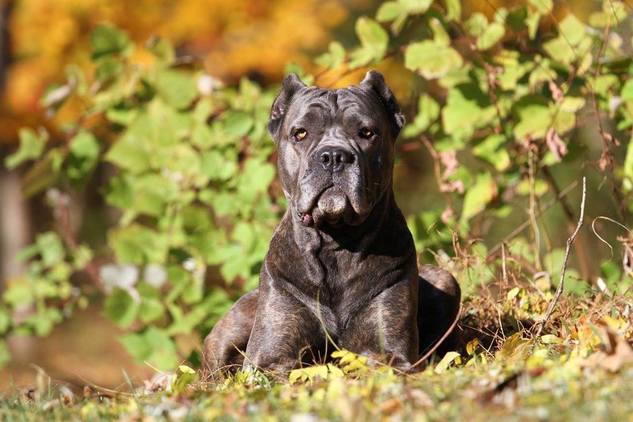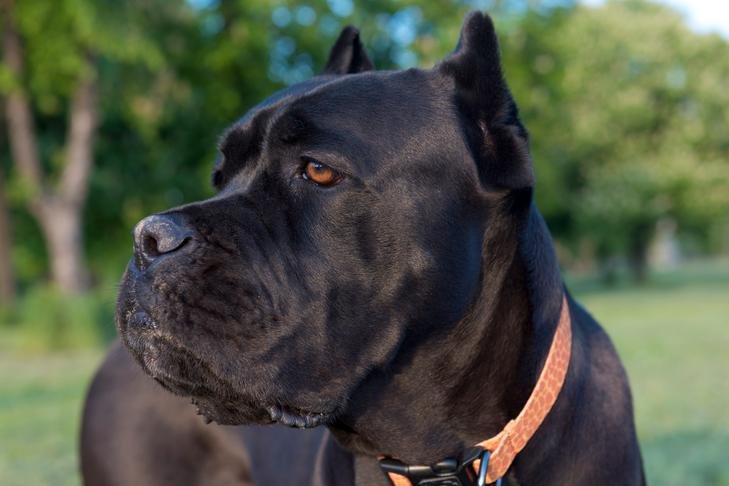When considering a pet dog for your home, the cane corso may not immediately come to mind. Known for their imposing size and strong instincts, these Italian mastiffs have a reputation as guardian dogs. But can a cane corso be a house dog? The answer may surprise you.
The cane corso, with its impressive history as a hunting and protection breed, may seem more suited for a large estate or a working environment. However, with proper training, socialization, and a dedicated owner, the cane corso can indeed thrive as a house dog. In fact, they are known for their loyalty and gentle nature with their families, making them excellent companions for the right home.
Yes, a cane corso can be a house dog. Despite their intimidating size, cane corsos are known for being loyal, affectionate, and gentle with their families. With proper training, socialization, and plenty of exercise, they can thrive in a home setting. They are protective by nature and make excellent guard dogs. However, their size and strength require responsible ownership to ensure they are well-behaved and receive the necessary physical and mental stimulation. Overall, with the right care and environment, a cane corso can be a loving and well-adjusted house dog.

Can a Cane Corso Be a House Dog?
A Cane Corso is a large and powerful dog breed originating from Italy. With their imposing stature and strong presence, you might wonder if a Cane Corso can be a suitable house dog. While it’s true that this breed requires specific care and training, they can indeed thrive in a home environment when provided with the right conditions and guidance. In this article, we will explore the factors that contribute to making a Cane Corso a successful house dog.
Temperament and Personality
The temperament and personality of a Cane Corso play a crucial role in their adaptability to a house environment. Despite their intimidating appearance, these dogs are known for their loyalty, affection, and strong bond with their families. Cane Corsos are often described as gentle giants who are courageous, confident, and protective. Their natural instinct is to guard and protect their loved ones, which makes them excellent watchdogs.
When properly trained and socialized from a young age, Cane Corsos can become calm, well-mannered, and adaptable. This breed thrives on human companionship and enjoys being part of the family. They are affectionate with their loved ones, including children, and can coexist harmoniously in a home setting.
However, it’s important to note that Cane Corsos are not recommended for first-time dog owners or families with inexperienced handlers. Due to their strong-willed nature and protective instincts, they require consistent training, leadership, and socialization to ensure they develop into well-behaved house dogs.
Exercise and Mental Stimulation
One crucial aspect to consider when determining if a Cane Corso can be a house dog is the breed’s exercise and mental stimulation needs. These dogs are active and intelligent, requiring regular physical activity to keep them happy and healthy.
Cane Corsos benefit from daily exercise, including walks, runs, and interactive play sessions. Providing them with enough physical stimulation helps prevent boredom, which can lead to destructive behavior. Having a securely fenced yard where they can safely roam and play is also advantageous.
In addition to physical exercise, mental stimulation is essential for keeping a Cane Corso engaged and mentally sharp. These dogs are highly intelligent and enjoy challenges. Training sessions, puzzle toys, and interactive games can help provide the mental stimulation they need while bonding with their owners.
Training and Socialization
Proper training and socialization are paramount when considering a Cane Corso as a house dog. These dogs are intelligent and have a strong desire to please their owners. Positive reinforcement training methods work best with this breed, as they respond well to rewards and praise.
Early socialization is crucial to ensure a Cane Corso develops into a well-rounded and well-behaved companion. They should be exposed to various people, animals, and environments from a young age to prevent fearfulness or aggression towards unfamiliar stimuli.
Consistency, patience, and firm yet gentle guidance are key when training a Cane Corso. As a guardian breed, they require an owner who can establish themselves as a strong leader without resorting to harsh punishment or aggression.
Safety Considerations
Due to their large size and protective nature, it’s essential to take certain safety precautions when keeping a Cane Corso as a house dog:
- Securely fence your yard to prevent escapes and provide a safe space for exercise.
- Supervise interactions between your Cane Corso and children to ensure they are gentle and respectful towards each other.
- Properly introduce your Cane Corso to visitors and unfamiliar guests to avoid territorial behavior.
- Train your dog to walk politely on a leash to prevent them from pulling or becoming reactive during walks.
| Grooming Needs | Low to moderate |
| Exercise Requirements | High |
| Trainability | High |
| Socialization | Crucial |
Is a Cane Corso the Right House Dog for You?
If you are considering a Cane Corso as a house dog, it’s important to assess your lifestyle, commitment, and experience as a dog owner. While they can be loving and loyal companions, they require dedicated training, socialization, exercise, and mental stimulation to thrive.
A Cane Corso can be a house dog when provided with a structured and stimulating environment. They excel when they have a clear role within their family and are given ample opportunities for physical and mental engagement. If you are willing to invest the time and effort into their care, a Cane Corso can be a loyal and devoted addition to your household.
Key Takeaways: Can a Cane Corso Be a House Dog?
- A Cane Corso can be a great house dog if properly trained and socialized from a young age.
- They are a protective breed and require firm and consistent leadership to prevent any behavioral issues.
- Cane Corsos need regular exercise to keep them mentally and physically stimulated.
- Proper training and socialization can help them coexist peacefully with other pets and children in the household.
- It’s important to consider factors like space, time commitment, and lifestyle before deciding if a Cane Corso is suitable for a house dog.
Frequently Asked Questions
Cane Corso dogs are known for their strength, loyalty, and protective nature. But can they be suitable as house dogs? Here are some commonly asked questions regarding this topic.
1. Are Cane Corsos good house dogs?
Yes, Cane Corsos can make excellent house dogs when properly trained and socialized. These dogs are known to be loyal, affectionate, and highly adaptable to different living environments. With the right guidance and attention, they can thrive in a household setting.
However, it’s important to note that Cane Corsos are a large and powerful breed, so they require proper exercise and mental stimulation. They are also protective by nature, which means early socialization and consistent training are crucial for ensuring they behave appropriately as house pets.
2. Do Cane Corsos get along well with children?
While Cane Corsos can be good with children when properly socialized, their size and strength should be taken into consideration. They are a large and robust breed, so supervision is necessary when they interact with young children to prevent any accidental injuries.
Early and ongoing socialization with children, including teaching them how to properly interact with the dog, is essential. While individual temperaments may vary, a well-trained and socialized Cane Corso can develop a strong bond with children and be a loyal and protective companion.
3. Can I keep a Cane Corso in an apartment or small house?
While Cane Corsos are large dogs, they can adapt to living in an apartment or small house as long as their exercise and mental stimulation needs are met. These dogs require daily exercise, and it’s important to provide them with regular walks, playtime, and opportunities to release their energy.
Living in a smaller space means you’ll need to be more diligent in ensuring the dog gets enough physical activity. Additionally, it’s important to provide mental stimulation through puzzle toys, training sessions, and interactive games to prevent boredom and potential destructive behaviors.
4. Are Cane Corsos easy to train?
Cane Corsos are intelligent dogs that can be trained successfully; however, they have a strong will and can be independent at times. Consistent and positive reinforcement training methods work best with this breed, as they respond well to praise and rewards.
Early socialization and basic obedience training are crucial for a well-behaved Cane Corso. It’s important to establish leadership and set clear rules and boundaries from an early age. Patience, consistency, and understanding their individual personality are key to training a Cane Corso effectively.
5. Are Cane Corsos prone to separation anxiety?
Like many other breeds, Cane Corsos can develop separation anxiety if not properly trained and gradually conditioned to being alone. These dogs are highly loyal and form strong attachments to their families, which means they may feel distressed when left alone for extended periods.
To prevent separation anxiety, it’s important to gradually accustom your Cane Corso to being alone for short periods of time and gradually increase the duration. Providing them with interactive toys, creating a comfortable and safe space, and ensuring they receive enough exercise and mental stimulation can also help alleviate separation anxiety.

Yes, a Cane Corso can be a house dog if properly trained and socialized.
This breed is known for its loyalty and protective nature, which makes it a great choice for a family pet.
However, it is important to note that Cane Corsos require regular exercise and mental stimulation to prevent boredom and destructive behavior.
Additionally, they may not be the best choice for first-time dog owners due to their dominant personality and need for consistent training.
Overall, with the right training, socialization, and a dedicated owner, a Cane Corso can thrive as a house dog and be a loyal and loving companion.
